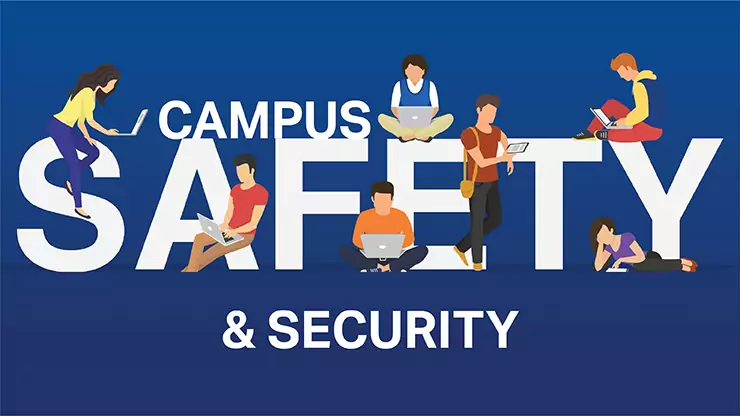Campus safety is of paramount importance. Colleges and universities are places of learning, personal growth, and community; ensuring the safety and well-being of students, faculty, and staff is fundamental to maintaining this environment. A safe campus fosters a conducive atmosphere for education, where individuals can pursue academic and extracurricular interests without undue fear or concern. Moreover, with the unfortunate reality of campus-related incidents in the past, many institutions have ramped up their safety measures, from enhanced security protocols to awareness campaigns and emergency response systems. Families, when selecting an educational institution, often prioritize campus safety as a deciding factor, reflecting its central role in the academic experience. The emphasis on campus safety underscores the commitment to protect the future of the nation – its young minds and leaders.
Why is Campus Safety so Important?
Before we begin, it’s important to point out the AAU Campus Climate survey conducted by the Association of American Universities. The 2019 survey found significant sexual misconduct on college campuses. Similarly, the 2020 Indicators of School Crime and Safety report points out that 38% and 36% of recorded crimes were burglaries and forcible sex offenses, respectively.
Considering the above figures, colleges need to put in place a strong campus security program. Without it, colleges may not be able to attract prospective students to their campuses. But, what constitutes such a safety program?
As the first step, colleges should review the policies and procedures put in place for campus safety. Secondly, and most importantly, they need to have support resources for students dealing with mental health issues.
Thirdly, the administration should look into their sexual assault prevention program. The program should take into account all forms of sexual assault. And lastly, the institution should have a strong policy against alcohol and drug abuse by students.
If You’re a Campus Crime Victim
Though many students go through their academic journey without issues, some unfortunately fall prey to crime. Knowing the following steps can help victims get assistance:
- Reach a safe location: Find a well-lit, busy area and stay until help comes.
- Call 911 immediately and heed the dispatcher’s guidance.
- Inform a trusted individual: A close friend or relative can offer immediate support.
- Seek legal advice: Understand your rights and potential actions.
- Get a restraining order if necessary: It can deter the assailant and lead to legal consequences if violated.
- Notify your bank if your financial information gets compromised.
- Consider changing housing if your residence is known to the perpetrator.
Reporting Campus Crimes
Sadly, as per the Rape, Abuse & Incest National Network (RAINN), only 20% of female college students aged 18-24 report sexual assaults to the police. However, reporting can offer protection and needed support. Here’s how to report:
- Inform the police, followed by campus security.
- Document any stolen property.
- Get medical help, especially after violent incidents.
- Report to university authorities.
- Seek emotional counseling, as many colleges provide free services.
Safety Tips on Campus
To ensure safety, consider these precautions:
- Familiarize yourself with the campus layout.
- Use locks for your room and car.
- Avoid walking alone at night.
- Locate emergency systems like blue light phones.
- Carry personal defense tools like pepper spray or a whistle.
- Attend self-defense training.
- Use campus escort services.
- Adjust your social media privacy settings.
- Consume alcohol responsibly.
- Store emergency contacts in your phone.
Campus safety laws and regulations
To mention the three most important campus safety laws and regulations–
- Title IX requires colleges to address discrimination in education programs and activities. Colleges also need to put in place a robust system for addressing complaints of sexual harassment.
- The Clery Act requires colleges to disclose the annual statistics of campus crime and fire. Colleges also need to put in place policies and procedures for campus safety. This includes procedures for sending crime warnings and emergency notifications.
- The Violence Against Women Act requires colleges to address the problem of sexual assault. In addition, colleges need to conduct training for addressing the problem.
Non-compliance with any of these laws can trigger an official investigation. Consequences include withholding of grants, monetary penalties, and loss of reputation. Besides this, it can deter parents and prospective students from selecting your college.
Above all, without strong campus safety, it would be difficult to address the issues of campus crime, discrimination, and sexual harassment. In this blog, we’ll take a closer look at these issues, and pinpoint how campus security helps to address them.
In addition, we’ll explore the role of the college staff and faculty in campus safety. We’ll also take a closer look at campus security authorities, and why they are so important.
Campus Safety training
And ultimately, the college must put in place a robust campus safety training program. The training should, specifically, concentrate upon
- Sexual assault awareness and prevention
- Title IX and Clery Act Awareness
- Alcohol and drug abuse
- Mental health
- Active shooter preparedness
Actually, the federal laws mandate most of the issues listed above. For instance, compliance with the Violence Against Women Act requires colleges to have education programs on all forms of sexual violence, including sexual harassment, sexual assault, dating violence, and stalking.
Campus safety policies and procedures
Regarding policies and procedures, you’d want to look at the new Clery Act Appendix for the Federal Student Aid Handbook. In addition to crime and fire statistics, it suggests that colleges should publish the following policies and procedures in their Annual Security Report for the benefit of prospective students.
- Alcohol consumption and illegal drug usage
- Handling complaints of sexual assault
- Emergency response and evacuation
- Missing student notifications
- Reporting criminal actions and other emergencies
- Security of and access to campus facilities
- Law enforcement authority and jurisdiction of security personal
Additionally, you should have policies that encourage prompt and accurate reporting of campus crimes as well. But, be cautious, the Clery Act appendix is not descriptive, but suggestive in nature.
On the subject of the role of college staff and faculty in campus security, federal laws have various requirements. Previously, under Title IX, faculty and staff were considered as responsible employees. They were required by law to address the acts of harassment reported to them. The new Title IX rules, published in May 2020, have removed this term. Now, only a Title IX coordinator can investigate complaints of harassment.
A similar change has happened to the definition of campus security authorities this year. The new guidance clarifies that colleges don’t need to consider faculty and staff with minimum student or campus responsibilities as CSAs. Unless the person falls in one of the following three categories, the colleges can decide which staff or faculty should be declared as a CSA.
- Members of campus police or safety department
- People who have responsibility for campus security, but are not a part of campus police or safety department
- Individuals specified in the security policy as people to whom students and employees can report crime.
To clarify, Campus Security Authorities are the members of staff and faculty to whom people can report crimes. CSAs have the duty of sharing the report with the campus safety office. These reports are, then, investigated by the campus police and filed in a crime log. Colleges use these crime logs to compile and publish the statistics of campus crime. The crime statistics must also be reported to the Department of Education via the Annual safety and security survey.
In addition, crime reports by CSAs allow the campus police to
- Issue timely and accurate crime warnings and emergency notifications
- Respond to emergencies and ongoing crimes
- Understand the nature of campus crime
FAQs About Campus Safety
- What is campus safety?
It comprises programs and initiatives that establish a safer environment for college students. - What is campus security?
It involves the steps a college takes to bolster on-campus security. - Why is campus safety crucial?
A safe environment enhances focus on academic activities and provides peace of mind for both students and parents. - Are colleges accountable for student safety?
While institutions are obliged to ensure safety and report crimes, students also have a role in their own safety. - What can students do to stay safe on campus?
Students can:- Stay aware of their surroundings.
- Travel in groups during nighttime or in unfamiliar areas.
- Use campus escort services or safety apps.
- Lock doors and windows in their residence.
- Attend safety workshops or seminars offered by the campus.
- Report any suspicious activity to campus security.
- What are some common safety concerns on campuses?
Common concerns include:- Theft or burglary
- Assault or violence
- Substance abuse
- Sexual harassment or assault
- Mental health issues
- Natural disasters or fires





